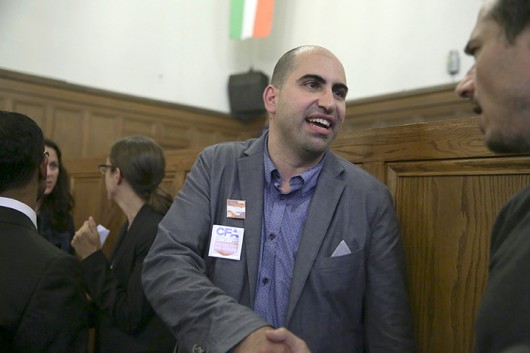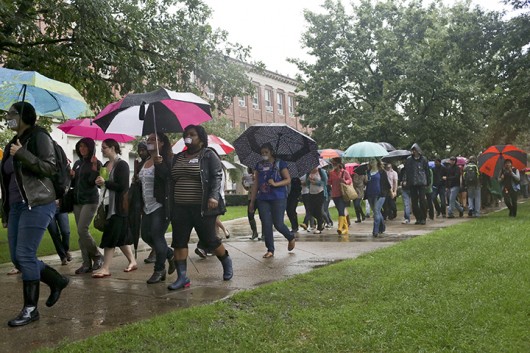
Professor Steven Salaita talks with a member of the press on Sept. 9 in Urbana, Ill. Salaita was fired from the University of Illinois after he posted tweets about Israeli attacks in Gaza.
Credit: Courtesy of MCT
Letter to the editor:
At this very moment, a crisis that has the potential to challenge the very meaning of academic freedom, shared governance and free-speech rights is embroiling the University of Illinois — and Ohio State had better take note.
Over the last four weeks, more than 5,000 scholars across the country and the world have joined a boycott of Illinois. At least 15 Illinois academic departments have formally expressed their views that Chancellor Phyllis Wise is no longer fit to fulfill her professional duties because of her sudden and arbitrary decision to block the hiring of professor Steven Salaita from a tenured professorship in Illinois’ American Indian Studies program. His crime? “Personal and disrespectful words” (read: criticism of Israeli human rights violations) posted to his Twitter account during Israel’s brutal assault on the Gaza Strip this summer.
The assault, misleadingly dubbed “Operation Protective Edge” by the Israeli government, was carried out with the help of U.S. taxpayer-funded bombs and munitions. By the end of the offensive, more than 2,000 Palestinian men, women and children were dead — about 70 percent of them civilians.
As numerous constitutional law scholars have already noted in open letters to Illinois, the civility standard by which Illinois justified its not hiring Salaita constitutes patent “viewpoint discrimination” — an unconstitutional and impermissible burden on free speech. Nevertheless, although false accusations about Salaita’s quality as an instructor and alleged anti-Semitic views have been thoroughly discredited by articles that looked at his teaching record and his tweets, he has still not been given his rightfully-earned teaching post. While pro-Israel forces and six-figure donors appear to have won the battle at Illinois (at least for now), they won’t win the war.

People march in support of professor Steven Salaita through the University of Illinois quad on Sept. 9 in Urbana, Ill.
Credit: Courtesy of MCT
It is exceedingly ironic that in the days after the American Studies Association voted to boycott Israeli academic institutions last year, Illinois released a statement opposing such efforts, while touting its belief in “the critical importance of the ability of faculty to pursue learning, discovery and engagement without regard to political considerations.” Yet it is Illinois that is now the target of a growing boycott for its wanton punishment of Salaita for his professed political views. The strength of this boycott movement will only increase after the Board of Trustees’ recent confirmation of its decision to de-hire Salaita. The damage to Illinois’ reputation and to academic freedom has been done.
Unfortunately, the same forces working to silence pro-Palestinian voices in Illinois are taking root in Ohio. Like Illinois, in the immediate aftermath of the American Studies Association vote last year, the OSU administration issued an official statement opposing boycotts without a single ounce of student or faculty input. Though it similarly touted its commitment to academic freedom, the administration’s false pretense of speaking for OSU’s diverse student and faculty population (which the Campaign for Boycotts, Divestment and Sactions at OSU called out in its online petition) betrayed its politically-expedient conception of academic “freedom.”
As we will soon see, the arbitrary — and clearly illegal — firing of Salaita, when juxtaposed with the powerful moral statement of the ongoing Illinois boycott, will expose Wise’s concern for “civility” for what it truly is: a poorly disguised attempt to appease donors and pro-Israel external forces. We at the Campaign for BDS at OSU stand in solidarity with Salaita and oppose the ongoing repression of Palestinian and pro-Palestinian voices on campus and in the community. We encourage you to join us in our efforts to hold OSU to a broader and more inclusive conception of “academic freedom.”
Brian Yeh
Member of the Campaign for BDS at OSU
[email protected]


